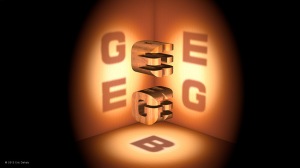
The ‘ambiguous object’ from the cover of Hofstader’s ‘Gödel, Escher, Bach: An Eternal Golden Braid.’
The Sapir-Whorf hypothesis states that language determines the way we think.
If this is true then our reality is highly subjective. The age-old (yet definitive) example is the Inuit tribes’ two zillion words for snow, versus the desert Bedouins’ zero words (or maybe one, describing the thin layer of frosted morning dew on sand).
What does this mean?
It means a person’s language fluency is comprised of words he or she needs to express, and the words that need to be expressed are affected by the reality he or she experiences.
So…what does this mean?
We can hypothesize that a language with 10,000 words for ‘acne’ will have more self-conscious speakers. A language with 10,000 words for ‘depression’ will have more depressed speakers. We could further delve into whether they coined the words to identify previously-diagnosed speakers or if they broadened the definition in order to include more depressed speakers, but we won’t. I believe I’ve made my point. Language determines the way we think, and shapes our reality.
Hypothetical: you land a job in a foreign country (with an equally foreign language), and the first words you learn are “no”, “not sure”, “I don’t know”, “I can’t”, “too difficult”. Guess what. You will probably be fired before your negativity has a chance to infect your co-workers. I’m sure there’s a study somewhere that backs this up with facts. I won’t link it. Because on to more interesting things.
An excellent visual example of how perspective can shape our reality is the so-called ‘ambiguous object’ pictured on the cover of Douglas Hofstader’s book Gödel, Escher, Bach: An Eternal Golden Braid. The object appears to be a different letter depending on the viewing angle, as can be seen by the shadows cast on the adjacent walls. Think of how differently your reality would appear if you viewed an issue from a different perspective. Like, literally.
Another example is the old tale of the blind men who each touched a part of an elephant, and in turn each came to wildly differing and inaccurate conclusions about the beast’s shape. The one who grabbed the leg said the animal was tall and sturdy like a tree. The one who grabbed the ear said it floundered and flapped like a bird. The one who grabbed the trunk said it was serpentine like a snake. Their disagreement is a commentary on the subjectivity of our perceptions of what is ‘the truth’. As the poet John Saxe so eloquently observed, “[the old men] rail on in utter ignorance of what each other mean, and prate about an elephant not one of them has seen.” Sight may not be everything, but a comprehensive ‘view’ is. Indeed, any subjective vision of truth is no truth at all.
Your language comprises what you need to express. Or rather, what you need to express comprises your language (it’s one or the other; I have no idea really). Concepts, ideas and feelings are beyond your comprehension because you don’t have the vocabulary to fully conceive and envision them. Furthermore, the language you choose to express these concepts depends on your (highly subjective) perception, and finally, your expectations.
So how do you define yourself?
The astrophysicist says ‘I am coagulated stardust’. The monk says ‘I am a vessel for supplication’. The biologist says ‘I am my brain’. The philosopher says ‘I am my mind’. The mathematician says ‘I am the result of a statistical probability’. The capitalist says ‘I am my own accumulated wealth.’ The nerd says ‘I am a level 86 warlock.’ The topologist (someone who studies how spaces and structures are organized) says ‘I am a donut’ (and technically, we are in fact shaped like donuts). The 16th century shoemaker Jakob Böhme says ‘I am a binary fractal self-replicating algorithm and the universe is a genetic matrix resulting from the existential tension created by my desire for self-knowledge’ (probably best we don’t get into that right now).
How can one question have so many different answers? The answer is perspective, and if I’m right, that means you or someone else might have a different answer (case in point!). Not really. I’m right. Let’s be clear on that.
Perspective and identity are defined by the roles we play. What we see is affected by who we are. In short: perspective skews, shapes, and defines language.
Language is symbolism, and symbolism hinges on perception, and, in a reality where perspective reigns, one old proverb rings all too true: nothing is real, everything is perceived. This is important. I believe that the perception of language is as fluid and relative as any abstract idea can be.
The only difference between a civil war and a revolution is who wins. Satisfactory and mediocre are the exact same thing, it just depends on your expectations. Fat chance and slim chance mean the exact same thing. The beginning of the end and the end of the beginning represent the same point in time. It just depends on your perception and expectations.
Any article on any blog that you read is neither well nor poorly written. It is only your expectations that leave you to decide whether it was a great article or whether it was the greatest article.
- Marwan Ayache


















